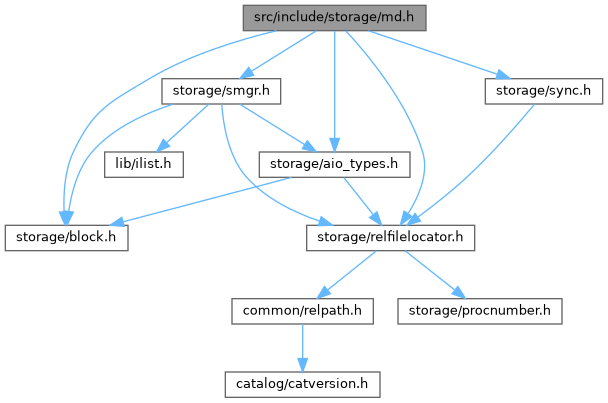#include "storage/aio_types.h"#include "storage/block.h"#include "storage/relfilelocator.h"#include "storage/smgr.h"#include "storage/sync.h"

Go to the source code of this file.
Variables | |
| PGDLLIMPORT const PgAioHandleCallbacks | aio_md_readv_cb |
Function Documentation
◆ DropRelationFiles()
|
extern |
Definition at line 1611 of file md.c.
References fb(), i, INVALID_PROC_NUMBER, MAX_FORKNUM, palloc_array, pfree(), smgrclose(), smgrdounlinkall(), smgropen(), and XLogDropRelation().
Referenced by FinishPreparedTransaction(), xact_redo_abort(), and xact_redo_commit().
◆ ForgetDatabaseSyncRequests()
Definition at line 1593 of file md.c.
References RelFileLocator::dbOid, INIT_MD_FILETAG, InvalidBlockNumber, InvalidForkNumber, RegisterSyncRequest(), RelFileLocator::relNumber, RelFileLocator::spcOid, and SYNC_FILTER_REQUEST.
Referenced by createdb_failure_callback(), dbase_redo(), and dropdb().
◆ mdclose()
|
extern |
Definition at line 724 of file md.c.
References _fdvec_resize(), fb(), FileClose(), and _MdfdVec::mdfd_vfd.
Referenced by mdexists().
◆ mdcreate()
|
extern |
Definition at line 222 of file md.c.
References _fdvec_resize(), _mdfd_open_flags(), Assert, ereport, errcode_for_file_access(), errmsg(), ERROR, fb(), fd(), mdfd(), PathNameOpenFile(), register_dirty_segment(), relpath, SmgrIsTemp, RelPathStr::str, and TablespaceCreateDbspace().
◆ mdexists()
|
extern |
Definition at line 203 of file md.c.
References EXTENSION_RETURN_NULL, fb(), InRecovery, mdclose(), and mdopenfork().
◆ mdextend()
|
extern |
Definition at line 487 of file md.c.
References _mdfd_getseg(), _mdnblocks(), Assert, ereport, errcode(), errcode_for_file_access(), errhint(), errmsg(), ERROR, EXTENSION_CREATE, fb(), FilePathName(), FileWrite(), InvalidBlockNumber, _MdfdVec::mdfd_vfd, mdnblocks(), PG_IO_ALIGN_SIZE, PG_O_DIRECT, register_dirty_segment(), relpath, SmgrIsTemp, and TYPEALIGN.
Referenced by _mdfd_getseg().
◆ mdfd()
|
extern |
Definition at line 1494 of file md.c.
References _mdfd_getseg(), Assert, EXTENSION_FAIL, fb(), FileGetRawDesc(), _MdfdVec::mdfd_vfd, and mdopenfork().
Referenced by mdcreate(), and mdopenfork().
◆ mdfiletagmatches()
Definition at line 1974 of file md.c.
References RelFileLocator::dbOid, fb(), and FileTag::rlocator.
◆ mdimmedsync()
|
extern |
Definition at line 1441 of file md.c.
References _fdvec_resize(), _mdfd_openseg(), data_sync_elevel(), ereport, errcode_for_file_access(), errmsg(), ERROR, fb(), FileClose(), FilePathName(), FileSync(), _MdfdVec::mdfd_vfd, and mdnblocks().
◆ mdinit()
Definition at line 190 of file md.c.
References ALLOCSET_DEFAULT_SIZES, AllocSetContextCreate, MdCxt, and TopMemoryContext.
◆ mdmaxcombine()
|
extern |
◆ mdnblocks()
|
extern |
Definition at line 1234 of file md.c.
References _mdfd_openseg(), _mdnblocks(), Assert, elog, EXTENSION_FAIL, FATAL, fb(), and mdopenfork().
Referenced by mdextend(), mdimmedsync(), mdregistersync(), mdwritev(), and mdzeroextend().
◆ mdopen()
|
extern |
Definition at line 713 of file md.c.
References fb(), and MAX_FORKNUM.
◆ mdprefetch()
|
extern |
Definition at line 747 of file md.c.
References _mdfd_getseg(), Assert, EXTENSION_FAIL, EXTENSION_RETURN_NULL, fb(), FilePrefetch(), InRecovery, IO_DIRECT_DATA, io_direct_flags, MaxBlockNumber, _MdfdVec::mdfd_vfd, and Min.
◆ mdreadv()
|
extern |
Definition at line 858 of file md.c.
References _mdfd_getseg(), Assert, buffers_to_iovec(), compute_remaining_iovec(), elog, ereport, errcode(), ERRCODE_DATA_CORRUPTED, errcode_for_file_access(), errmsg(), ERROR, EXTENSION_CREATE_RECOVERY, EXTENSION_FAIL, fb(), FilePathName(), FileReadV(), i, InRecovery, lengthof, _MdfdVec::mdfd_vfd, Min, PG_IOV_MAX, and zero_damaged_pages.
◆ mdregistersync()
|
extern |
Definition at line 1390 of file md.c.
References _fdvec_resize(), _mdfd_openseg(), fb(), FileClose(), _MdfdVec::mdfd_vfd, mdnblocks(), and register_dirty_segment().
◆ mdstartreadv()
|
extern |
Definition at line 996 of file md.c.
References _mdfd_getseg(), Assert, buffers_to_iovec(), elog, ereport, errcode_for_file_access(), errmsg(), ERROR, EXTENSION_CREATE_RECOVERY, EXTENSION_FAIL, fb(), FilePathName(), FileStartReadV(), IO_DIRECT_DATA, io_direct_flags, _MdfdVec::mdfd_vfd, Min, PGAIO_HCB_MD_READV, PGAIO_HF_BUFFERED, pgaio_io_get_iovec(), pgaio_io_register_callbacks(), pgaio_io_set_flag(), and pgaio_io_set_target_smgr().
◆ mdsyncfiletag()
Definition at line 1904 of file md.c.
References _mdfd_open_flags(), _mdfd_segpath(), fb(), FileClose(), FilePathName(), FileSync(), FileTag::forknum, INVALID_PROC_NUMBER, IOCONTEXT_NORMAL, IOOBJECT_RELATION, IOOP_FSYNC, MAXPGPATH, MD_PATH_STR_MAXLEN, PathNameOpenFile(), pgstat_count_io_op_time(), pgstat_prepare_io_time(), FileTag::rlocator, FileTag::segno, smgropen(), MdPathStr::str, strlcpy(), and track_io_timing.
◆ mdtruncate()
|
extern |
Definition at line 1301 of file md.c.
References _fdvec_resize(), Assert, ereport, errcode_for_file_access(), errmsg(), ERROR, fb(), FileClose(), FilePathName(), FileTruncate(), InRecovery, _MdfdVec::mdfd_vfd, register_dirty_segment(), relpath, and SmgrIsTemp.
◆ mdunlink()
|
extern |
Definition at line 337 of file md.c.
References fb(), InvalidForkNumber, MAX_FORKNUM, and mdunlinkfork().
◆ mdunlinkfiletag()
Definition at line 1956 of file md.c.
References fb(), MAIN_FORKNUM, MAXPGPATH, relpathperm, FileTag::rlocator, RelPathStr::str, and strlcpy().
◆ mdwriteback()
|
extern |
Definition at line 1175 of file md.c.
References _mdfd_getseg(), Assert, EXTENSION_DONT_OPEN, fb(), FileWriteback(), IO_DIRECT_DATA, io_direct_flags, and _MdfdVec::mdfd_vfd.
◆ mdwritev()
|
extern |
Definition at line 1070 of file md.c.
References _mdfd_getseg(), Assert, buffers_to_iovec(), compute_remaining_iovec(), elog, ereport, errcode_for_file_access(), errhint(), errmsg(), ERROR, EXTENSION_CREATE_RECOVERY, EXTENSION_FAIL, fb(), FilePathName(), FileWriteV(), lengthof, _MdfdVec::mdfd_vfd, mdnblocks(), Min, PG_IOV_MAX, register_dirty_segment(), and SmgrIsTemp.
◆ mdzeroextend()
|
extern |
Definition at line 552 of file md.c.
References _mdfd_getseg(), _mdnblocks(), Assert, elog, ereport, errcode(), errcode_for_file_access(), errhint(), errmsg(), ERROR, EXTENSION_CREATE, fb(), file_extend_method, FILE_EXTEND_METHOD_WRITE_ZEROS, FileFallocate(), FilePathName(), FileZero(), InvalidBlockNumber, _MdfdVec::mdfd_vfd, mdnblocks(), register_dirty_segment(), relpath, and SmgrIsTemp.
Variable Documentation
◆ aio_md_readv_cb
|
extern |
Definition at line 169 of file md.c.